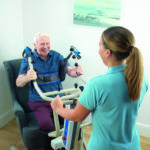SCI-induced infirmity: 5 tips to improving your Lung Health

The spinal cord is one of the most vital organs in your body. Together with the brain, they make up the Central Nervous System – one of the two nervous systems responsible for transmitting messages between the body and the brain.
Consequently, a spinal cord injury (SCI) could affect any organ or part of your body, the lungs inclusive. One of such effects is the loss of function in the muscles needed for breathing. This could cause breathing difficulties, cough etc. and might well lead to more severe ailments such as lung infections and pneumonia.
If you’ve had a spinal cord injury in which your lung was affected, there is a possibility of a total or partial paralysis of the breathing muscles, depending on the severity of the injury.
In the event of a total paralysis of your breathing muscles, you may need to be placed on a ventilator to assist you in breathing. On the other hand, if you’ve only lost partial control of your breathing muscles, it is essential to engage in activities that help prevent the condition from further deteriorating and as well, help improve your lungs’ health.
Here are 5 tips on managing an SCI-induced lung infirmity.
1 Perform breathing exercises
Deep breathing, also called diaphragmatic breathing, encourages full oxygen exchange in the lungs. Breathing exercises also help strengthen your breathing muscles and relieve chest pain.
2 Quit smoking
Smoking has bad effects on not just the lungs, but other vital organs like the stomach, skin, brain, heart etc. It can cause lung-related infections and diseases such as cancer and pneumonia. So, if you smoke, now is the time to quit.
3 Pay particular attention to pneumonia symptoms.
Pneumonia is an infection you don’t want to contend with. It can be particularly life-threatening for people with health problems. Get vaccinated against pneumonia and consult your physician immediately you experience any of the symptoms of pneumonia such as chest pain when you cough or breathe, fever, nausea and shortness of breath.
4 Try out various coughing techniques
Partial paralysis of the breathing muscles can cause difficulties in breathing making mucus hard to cough up. Therefore, it is important to learn different techniques to help you cough effectively. Should you encounter any difficulty in coughing, consult your physician.
5 Adopt a healthy diet
It is important to maintain nutritional balance in your diet. This can help prevent you from infections and gaining excessive weight. Also, being well-hydrated is paramount as it can help keep the mucus in your lungs thin and easy to cough up.
Should You Change Your Nutrition After A Spinal Cord Injury? Find it out here.







